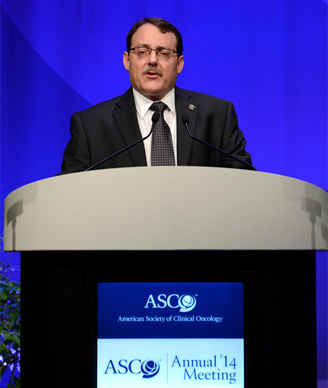Similar Survival for First-Line Avastin, Erbitux in Colorectal Cancer
First-line treatment with chemotherapy plus either bevacizumab or cetuximab resulted in equally effective outcomes for patients with metastatic colorectal cancer.
Alan P. Venook, MD; photo by © ASCO/Phil McCarten 2014

CHICAGO-First-line treatment with a chemotherapy backbone plus either the anti-VEGF bevacizumab (Avastin) or the anti-EGFR cetuximab (Erbitux) resulted in equally effective outcomes for patients with metastatic colorectal cancer and wild-type KRAS, according to the long-awaited results of the phase III CALGB/SWOG 80405 trial presented at the 2014 American Society of Clinical Oncology (ASCO) Annual Meeting.
Patients treated with either targeted therapy plus a chemotherapy backbone of either FOLFOX (oxaliplatin/5-FU/leucovorin) or FOLFIRI (irinotecan/5-FU/leucovorin) had a median overall survival of about 29 months.
Results of the study were presented by Alan P. Venook, MD, the Madden Family Distinguished Professor of Medical Oncology and Translational Research at the University of California in San Francisco, Calif., at the Plenary Session, Sunday, June 1.
“Overall survival on chemotherapy/cetuximab is no different than on chemotherapy/bevacizumab in first-line treatment of these patients, and FOLFIRI or FOLFOX with either bevacizumab or cetuximab can be considered options for first-line treatment of patients with KRAS wild-type metastatic colorectal cancer,” Venook said. “This was accomplished across a broad clinical trials network and suggests that the results apply in a variety of practice settings.”
The study originally included 1,420 patients with metastatic colorectal cancer assigned to chemotherapy with FOLFOX (73.4%) or FOLFIRI (26.6%; investigator choice) and then randomly assigned to also receive cetuximab (400 mg/m2 × 1 then 250 mg/m2 once a week), bevacizumab (5 mg/kg twice a week), or both. The arm studying cetuximab plus bevacizumab was closed early. Once KRAS mutation testing became available, the study was amended to include only the 1,137 patients with KRAS wild-type tumors. The median follow-up was 24 months.
Data revealed no significant differences between the two arms for overall survival or progression-free survival. Median overall survival was 29.9 months for patients assigned chemotherapy plus cetuximab compared with 29 months for patients on chemotherapy plus bevacizumab (HR = 0.925; 95% CI, 0.78-1.09). Median progression-free survival was 10.8 months for bevacizumab compared with 10.4 months for cetuximab (HR =1.04; 95% CI, 0.91-1.17).
The researchers also looked at survival outcomes according to chemotherapy backbone. The overall survival for FOLFOX/cetuximab was 30.1 months compared with 26.9 months for FOLFOX bevacizumab, a non-significant difference. Patients on FOLFIRI/bevacizumab had a median overall survival of 33.4 months compared with 28.9 months for FOLFIRI/cetuximab, but again the difference was not statistically significant.
No new treatment adverse effects were detected in this study. Patients assigned bevacizumab experience common side effects including high blood pressure, headache, mouth sores, nosebleed, diarrhea, loss of appetite, fatigue, and weakness. Common side effects of cetuximab include an acne-like rash, itching, changes in fingernails and toenails, infections, fatigue, and low blood electrolyte levels.
Venook said that analyses looking at response rates, duration of therapy and dose intensity, and details of second-line and later treatments are still ongoing.
“The trial essentially asked if patients with KRAS-wild-type colorectal cancer would benefit more from the addition of cetuximab or bevacizumab to their chemotherapy. The answer is that the outcome is essentially the same,” said Leonard J. Saltz, MD, chief of the gastrointestinal oncology service at Memorial Sloan-Kettering Cancer Center. “However, given that the skin rash from cetuximab is a very difficult toxicity for patients to live with long term, and given that the price of cetuximab is essentially double that of bevacizumab at the doses used, I would continue my current practice, which is to virtually never use anti-EGFR monoclonal antibodies in the first-line treatment of metastatic colorectal cancer.”